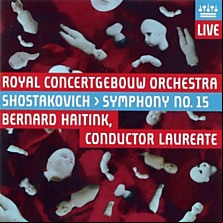BBC Review 1bj6o
The focus is on its genuinely symphonic breadth, the deep shadows and pregnant pauses.
Andrew McGregor 2012
Dmitri Shostakovich’s last symphony, No. 15, was written over three months in 1971 after a lifetime’s struggle to make music despite the machinations of Soviet politics. In a dacha near Leningrad, Shostakovich found the peace and quiet he needed to finish the symphony, writing in the morning, walking and lunching with a friend, before taking a glass of vodka with the BBC World Service News… and retuning to Radio Moscow in case they were discovered. He was 65; he’d had had a heart attack, his health was poor, and the 15th Symphony is understandably overshadowed by intimations of mortality.
The notes describe it as "a cradle-to grave work": beginning with youthful élan, concluding like a last breath. Some kind of symphonic last testimony, then? It’s certainly Shostakovich in enigmatic and reflective mode, looking back at his own musical history with quotations from earlier scores, as well as Wagner’s Tristan and the Ring, whiffs of such terminal touchstones as Tchaikovsky’s 5th, Mahler’s 9th, and Strauss’ ‘A Hero’s Life’; and most obviously in the first movement, quirky quotations from Rossini’s William Tell.
Bernard Haitink’s first recording of Shostakovich 15 back in the late-70s was one of the finest things in his Decca cycle of the Symphonies, so to say that he’s sured it with this new put together from concerts with the Royal Concertgebouw Orchestra in Amsterdam in 2010 is high praise. If anything, Haitink underplays the opportunities for grotesque humour and the sardonic edge to some of the writing, focusing instead on its genuinely symphonic breadth, the deep shadows and pregnant pauses. It’s gripping from start to finish, and the playing Haitink inspires is rarely short of stunning, vibrant with tension. There’s almost nothing in the performance to betray its live origins, and the slightly opaque, shadowy sound at least suits the work, and opens up a little if you can listen in surround.
Haitink feels his way through the fabric of quotations and allusions with a sombre certainty that’s deeply moving, and the ending settles on the symphony with a gently mechanistic finality that brooks no argument. It’s all over. No applause. The rest is silence.



